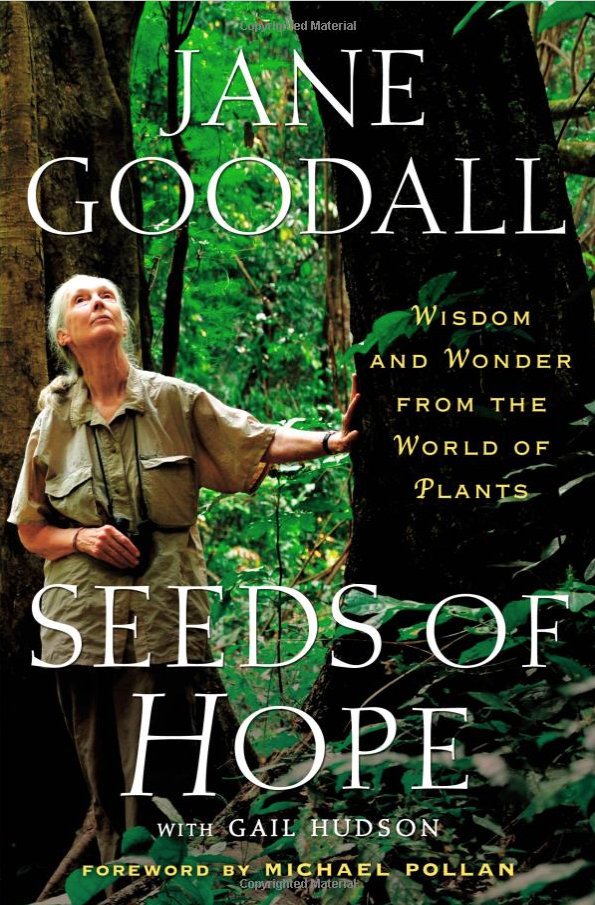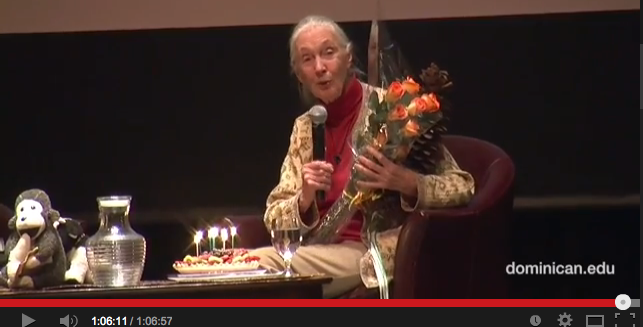 JANE GOODALL CELEBRATED HER 80TH BIRTHDAY ON APRIL 5, and on April 6 I had the wonderful opportunity to film her at Dominican University of California. With her co-author Gail Hudson and Elaine Petrocelli of Book Passage, Goodall had a conversation about her latest book, “Seeds of Hope.”
JANE GOODALL CELEBRATED HER 80TH BIRTHDAY ON APRIL 5, and on April 6 I had the wonderful opportunity to film her at Dominican University of California. With her co-author Gail Hudson and Elaine Petrocelli of Book Passage, Goodall had a conversation about her latest book, “Seeds of Hope.”
In his forward to the book, author Michael Pollan writes, “‘Seeds of Hope’ is not just a love letter to the plant world, though it is certainly that. It’s also a call to arms, sounding the alarm about habitat destruction, the violence of industrial agriculture, and the risks of genetic engineering.”
To set the context for her book, Goodall described her childhood fascination for plants and animals, then detailed the important early work of the plant hunters — individuals and botanists who, over the centuries, set out to find new and exotic plants from around the world. Her special interest was in Carl Linnaeus (1707-78), who developed the system of plant classification that we all learned in high school biology: domain, kingdom, phylum, class, order, family, genus and species.
Goodall then writes about the use and abuse of plants, from positive medicinal and sustenance uses to those plants linked to addiction, like tobacco, coca and opium.
But the heart of the book is in the concluding Part Four, “The Way Forward.” Goodall has found, through her foundation work in Tanzania, that sustainable agriculture in coffee growing produces a solid livelihood for more than 13,000 villagers. She challenges corporate agribusinesses to prove their model of agriculture, which uses so much fertilizer and pesticides, is really the only way to feed a hungry world.
“Yet still the powers that support and benefit from industrial agriculture continue to insist that their method is the only way to combat world hunger,” she wrote. “Perhaps the time has come when we should demand that the advocates of agribusiness prove to us that their model can feed a population of 9 billion human beings.”
 Naturally, Goodall advocates growing our own food and supporting Community Supported Agriculture. We needn’t look further than our own very successful Benicia Community Gardens to see the good food and good community engendered from these ideas right here in town! Our farmers market is about to start next week, April 24, and we have many choices for CSAs!
Naturally, Goodall advocates growing our own food and supporting Community Supported Agriculture. We needn’t look further than our own very successful Benicia Community Gardens to see the good food and good community engendered from these ideas right here in town! Our farmers market is about to start next week, April 24, and we have many choices for CSAs!
I think Goodall, who went on to talk about the plight of the forests, would applaud the work being done in Benicia. We have our local Benicia Tree Foundation and recognition of Benicia as being a Tree City USA. She highlighted the massive destruction of forests and the need for employing the best forestry practices to preserve and conserve them, and concluded her book with several amazing stories of trees that are survivors and the people who realize their importance and have worked to preserve them. They ranged from a 500-year-old camphor tree that survived the atomic bombing of Nagasaki, to “Survivor,” a Callery pear tree that survived 9/11 at the World Trade Center plaza. I can’t help but think of our California survivors and giants, the redwoods and sequoias.
Of the many times I have been to Muir Woods, I don’t recall hearing any loud voices or noises. It has always been a walk of wonder and amazement through the redwoods, an awe-inspiring stroll in one of this Earth’s most beautiful places.
At the end of the lecture, Liz Chiorella of Dominican carried out a beautiful birthday cake with candles blazing. The audience to sing “Happy Birthday” to this wonderful guardian and champion of the Earth. Jane thanked us for this tribute and added, “I promised a chimpanzee call. And chimpanzees would enjoy this cake!” She went on to give us both the chimpanzee greeting — and then their cake call!
Happy Birthday, Jane!
* * *
Mark your calendar to add your input and recommendations to the “Bicycle Benicia” attitude and infrastructure surveys May 12 at the Benicia Community Center, 370 East L St., Room 2, at 7 p.m.
Learn more
• Jane Goodall in conversation: youtube.com/watch?v=jxjON0hgzEA&feature=share&list=PLD77AA7538596A6BD
• Good Eggs local food systems (Bay Area): goodeggs.com/sfbay/producers
• Seed Cathedral’s Thomas Heatherwick: ted.com/talks/thomas_heatherwick and vimeo.com/10774063
Constance Beutel is a the chair of Benicia’s Community Sustainability Commission. She is a university professor and videographer and holds a doctorate from the University of San Francisco.







Leave a Reply